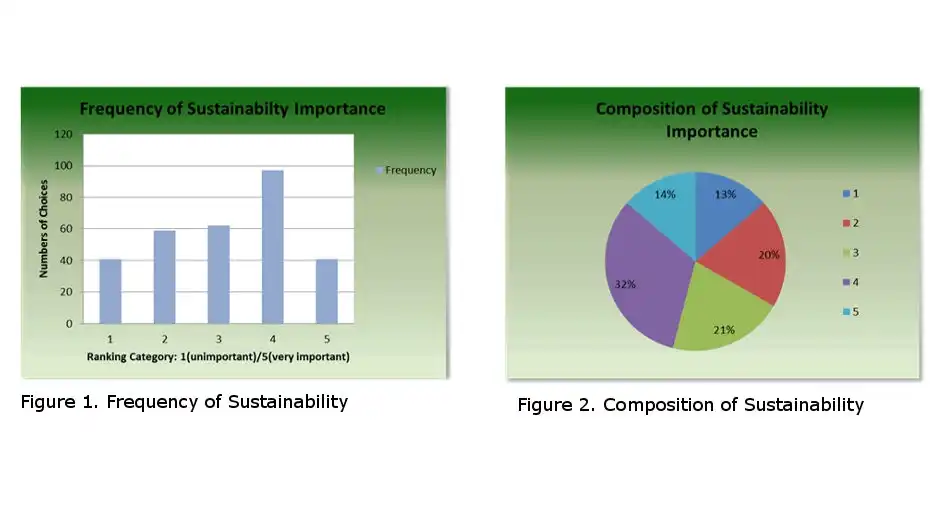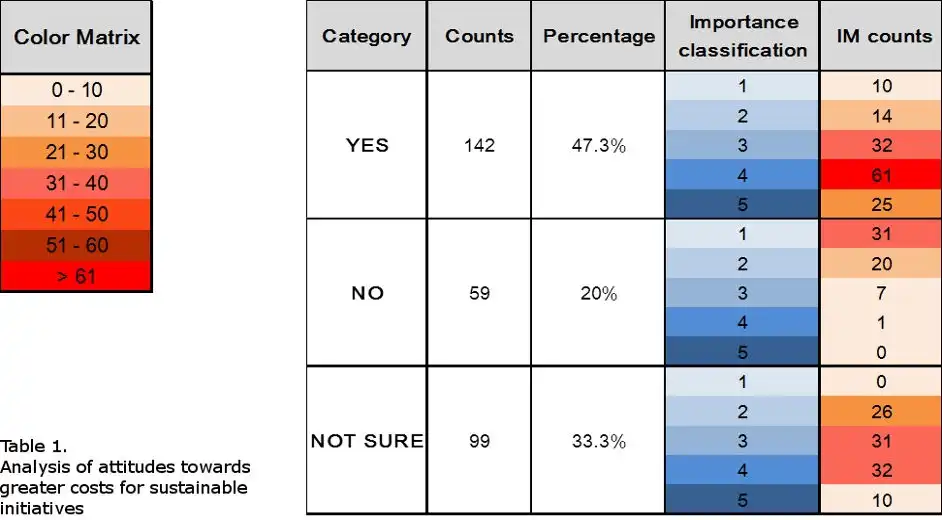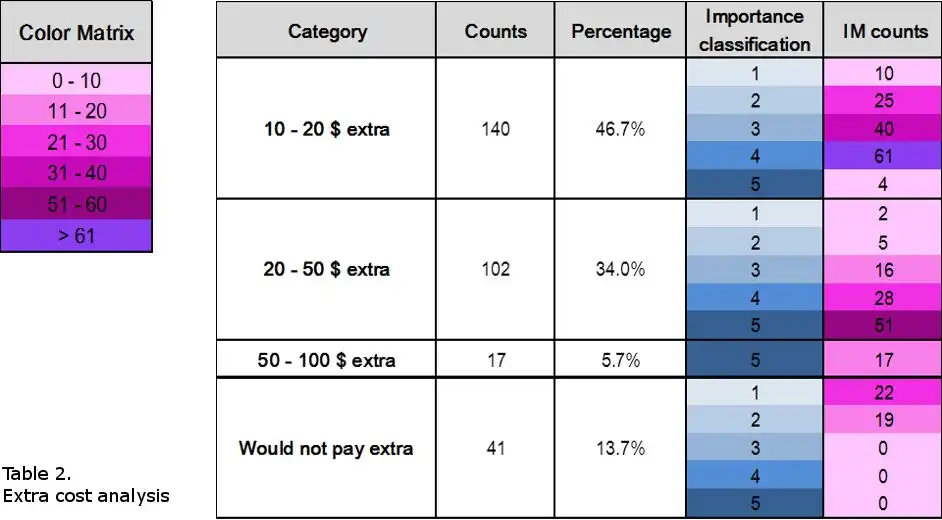1. People’s attitudes towards sustainability issues when booking a luxury holiday
Ranking from 1 (not at all important) to 5 (very important)
Fig.1 shows that Category 1 (sustainability is not at all important) and 5 (sustainability is very important) have the same votes, totally 13.3% each.
Category 2 (less important) has 20% of the sample, almost the same as Category 3 (neutral) at 21%. Category 4 (sustainability is important) has the most votes and represents 32% of the sample, showing the extent of general public concern about the environment, ecology and sustainability when considering luxury travel.
This indicates that, for the luxury travel business, issues around sustainability are becoming more and more important for both travelers and hoteliers.
2. People’s attitudes towards paying more for a hotel/resort which has sustainable initiatives in place
From Table.1, the results show that 47.3% people are willing to pay more for a hotel/resort that offers some kind of sustainable initiatives, 20% people are not willing to pay extra and 33.3% are not sure about it.
The color matrix gives a clear overview of the distribution within each Importance Ranking under three categories. Among the people under Category YES, it’s clear that those who give higher importance scores are more willing to spend more money on sustainable issues.
For the people under Category NOT SURE, the majority is distributed from “Less Important” to “Important”; this could suggest that although people don’t highly value sustainability or keep neutral when booking luxury travel, they are still willing to pay more if the quoted price includes sustainable initiatives as standard.
Under Category NO, a clear correlation shows that the more people consider sustainability to unimportant, the less willing they are to pay extra for luxury travel.

3. People’s attitudes towards paying how much extra money per hotel night to stay in an eco-friendly hotel/resort
Table.2 illustrates that in general the more people are concerned about sustainability, the more they are willing to pay for luxury travel. Around 86.3% of the public are willing to spend more, which is almost twice higher than the rate in Question 2 which is 47.3%.
To be more specific, 46.7% of people would pay 10-20$ more no matter whether they rate sustainability less important, neutral or important. 34.0% of respondents would pay 20-50$ more, the majority of whom care about sustainability a lot.
Only 5.7% of people think sustainability is very important when considering luxury travel and would pay 50-100$ more. 13.7% of people who rate sustainability considerations as less important or not at all important are unwilling to pay anything extra.

4. Respondent opinions on Sustainability versus Luxury
The majority of respondents (80%) believed that sustainability and luxury could be combined together, with a wide variety of opinions on how this could be achieved.
Some think that luxury could mean enjoying the best that the natural environment provides in terms of relaxing surroundings and beautiful scenery, which is a state of mind; some admitted that they would be convinced by luxury hotels with an overall sustainable concept and therefore willing to pay more.
Others claimed that if wealthy people could afford the expense of a luxury holiday, they should also be able to sustain extra charges dedicated to ensuring sustainable initiatives; alternatively, luxury tourism could successfully be sustainable by ensuring the welfare of the staff or the use of locally sourced, organic produce & products and is therefore not limited to eco-friendly initiatives like recycling or water reduction.
Finally, creative designs such as sustainable buildings or products that make full use of natural/recycled/sustainable resources and can be recyclable can also be tailored to a luxury consumer, such as Apple products and Muji (a Japanese brand) or luxury hotels could use sustainable energy resources such as solar energy, which is not cheaper than electricity but still sustainable.
On the opposite side, 13.3% of respondents thought that sustainability and luxury are contradictory to each other because luxury to some degree means wastage, high consumption and excessiveness. Examples of this were the enormous fuel consumption of luxury cars, private jet or helicopter flights, yachts and other transportation, high consumption accommodation/facilities and the large amount of consumption from washing towels and sheets daily as is offered in many luxury hotels as part of their 5 star service.
Also mentioned was the fact that when an otherwise eco-friendly person is considering luxury travel (i.e. has the option to choose a luxury hotel), sustainability would come secondary to the occasional treat of luxury enjoyment, justified by their otherwise daily dedication to living a sustainable or eco-friendly lifestyle.
6.7% of people were not sure: examples given included the danger of “greenwashing” where hotels heavily promote one aspect of their service that is environmentally friendly at the expense of the impact the hotel has on the surrounding locality or the welfare and working conditions of its staff.
Related to this concern, others were of the opinion that sustainability shouldn’t be sold or marketed as a product or service but should be done by the product or service providers as a matter of course and included in the price of a stay at the hotel as standard.
5. Conclusion
Ecotourism is a burgeoning niche within the tourism sector, and according to the UNs WTO is expected to post continued growth over the coming decades, partly because of raised consciousness about the long-term consequences of human and environmental interactions as well as the pursuit of increasingly unique tourism experiences.
While for the moment the definition of “luxury” is debatable by the public, entailing conflicting opinions of the possibility for successfully combining luxury with sustainability.
On the one hand, the highest quality and services should not necessarily mean excessive consumption, waste and mistreatment of staff, and should be designed in a way that facilitates a minimum use.
On the other, people hold a totally inverse view that luxury inherently entails large consumption of natural resources and energy.
However, the concept of luxury can also include the state of mind that in a busy world, having space and time to enjoy and explore a natural environment is luxury in itself, and as long as a certain standard of quality is maintained in accommodation, this is more important than having excessive or wasteful services on offer at a hotel or resort.
Green-wash was also highlighted as a potential issue of concern; while eco-tourism remains a relatively small customer niche, it can offer a point of differentiation to those luxury hotels that do offer sustainable concepts and therefore maybe of interest when hoteliers are looking for untapped niches.
It was felt that “greenwashing” in today’s marketing strategies had the potential to create misconception and misunderstanding for the small but committed number of customers who really do want to spend money on sustainability.
Therefore, hotels that use strategies that are perceived as “greenwash” should be aware that in the future they might face severe PR problems and risk losing the custom of those who are highly familiar with issues in sustainability.
Report by Liu Feng for Premium Europe, April 2014





